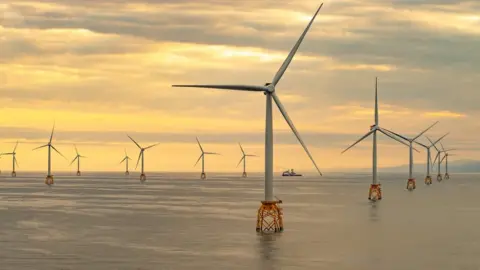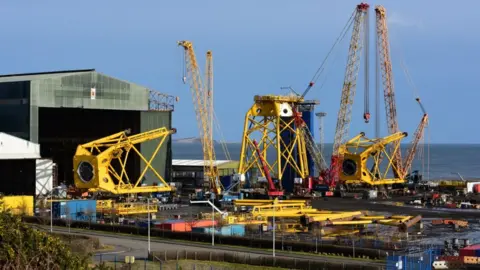US firm pips BiFab to secure share of offshore wind order
 BOWL
BOWLThe battle to secure manufacturing orders for Scottish firms seeking a share of offshore wind orders has suffered a severe blow.
BiFab, with two yards in Fife and one near Stornoway, failed to win any of the work for the Seagreen array being built off the east of Fife.
All of the platforms for its 114 turbines are being manufactured in China and the United Arab Emirates.
The contract was announced by winning bidder Texas-based Fluor Corporation.
The decision followed months of planning to secure at least some of the work for the mothballed yards at Methil and Burntisland.
They were saved from permanent closure in April 2018, in a rescue package led by Canadian firm DF Barnes, with a stake taken by the Scottish government.
 Getty Images
Getty ImagesA statement by DF Barnes the decision was"extremely disappointing", a "missed opportunity for Scotland and a matter of deep regret".
It added: "Since acquiring BiFab we have been trying exceptionally hard to get people back to work in our yards.
"Instead Scottish and Southern Energy (SSE), in the face of what could be one of the worst recessions in modern history, has chosen to give all of the fabrication work for one of the largest offshore windfarm projects in the world to companies in China and UAE."
But an industry insider accused DF Barnes of failing to put any funds behind its bid - either in improving the Fife yards or in providing financial guarantees that it would deliver on time.
Trade unions have been highly critical of the failure to secure more engineering work in offshore renewable power.
GMB official Hazel Nolan said: "We warn industry majors like SSE and the governments at Holyrood and Westminster that constant disappointment is now turning to growing anger - our communities dependent on offshore wind fabrication contracts are being totally failed, and so is the country".
 Ken Jack/Getty Images
Ken Jack/Getty ImagesSSE Renewables, a division of the Perth-based energy firm developing the Seagreen wind array, said it had worked hard to ensure some of the work went to a Scottish contractor, but blamed the price gap between the Chinese and the Fife yards.
A spokesman said: "We wanted nothing more than to award work to a Scottish firm that would help set them up for future success.
"Unfortunately, on this occasion, the gap between BiFab's offering and that of competing fabricators was too significant to close".
He added the decision was further proof that the industry and government need to step up efforts to build "an investable, globally competitive UK supply chain".
The BiFab yards supplied platform jackets for the oil industry, and they were seen as the best hope in Scotland for fabricating the platforms for offshore wind turbines.
But repeatedly, contracts have gone to overseas yards, including Spain, Indonesia, the UAE and now China.
Overseas yards are able to build at scale and with prices far lower than BiFab can achieve. They may also gain from government subsidy.
The main Chinese fabrication yard being used for Seagreen platforms completes a wind farm jacket every 10 days.
DF Barnes is still negotiating about a contract for fabrication work as part of the NnG (Neart na Gaoithe) wind farm being developed off the Firth of Forth by French energy firm EDF, and said it hopes to make "a positive announcement shortly".
